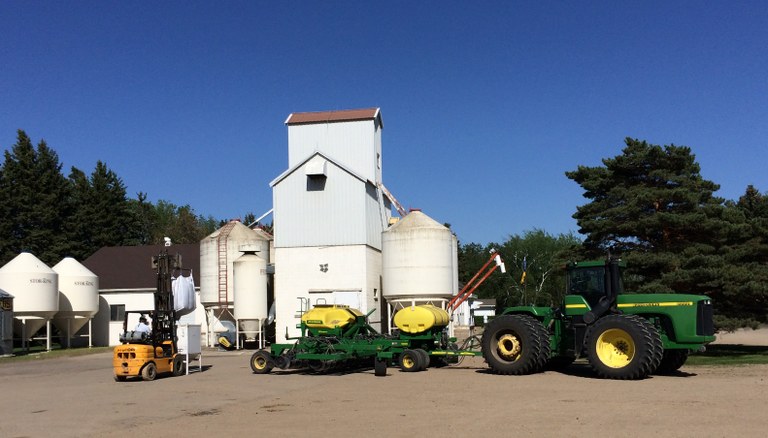Foundation Seedstocks at the CREC
One of the major programs of the CREC is the Foundation Seedstocks program. This program is an integral part of the broader NDSU Foundation Seedstocks Project at the North Dakota Agricultural Experiment Station (NDAES).
The overall project operates under the leadership of the Foundation Seedstocks director who is based at the Main Campus in Fargo. The project includes individual seed increase programs operating at the Agronomy Seed Farm in Casselton and at the Research Extension Centers at Carrington, Langdon, Minot and Williston. Production and conditioning of foundation seed at these multiple locations maximizes our potential to introduce improved crop genetics to farmers, expands the diversity and number of varieties we increase, and minimizes chances of crop failure. The CREC’s foundation seedstock program typically produces and conditions 15 to 26 varieties among seven different crops annually.

The foundation seedstocks project is responsible for providing foundation grade seed to seedstock growers across the state and region. These growers represent both individual producers and seedsman who have established seed businesses serving other growers. Foundation grade seed represents seed of the highest purity standards and is the progeny of breeder grade seed or seed that has been maintained from early generation propagation. Seedsman who plant foundation grade seed are then eligible to produce registered and/or certified classes of seed. The NDSU Foundation Seedstocks Project primarily produces foundation seed of crop varieties developed by NDSU plant breeders. New varieties are released by the NDAES after they have been shown to possess improved traits beyond those of current varieties. When a new variety is released the plant breeder turns over the available breeder seed to the seedstocks program for propagation and multiplication. This process starts with a limited amount of seed, typically around 3 to 5 bushels. Through aggressive increase strategies the team of increase programs manages this seed under strict production guidelines so that initial release of the seed to the public occurs as soon as possible. For most crops and varieties the goal is to have at least 2,000 to 5,000 bushels of seed for initial distribution. The primary means of initial distribution is providing the foundation seed to participating counties of the North Dakota Crop Improvement & Seed Association.
Attaining the quality and purity standards required to produce, condition and achieve a class of certified seed requires an increased management level for one’s land, equipment and facilities. The production of any class of seed (foundation, registered, or certified) requires field inspection and laboratory testing by the North Dakota State Seed Department (NDSSD). An important part of producing certified seed is the field inspection process. To have fields inspected growers must submit field inspection applications to the NDSSD. Application forms may be obtained at a county Extension office or directly from the NDSSD at http://www.nd.gov/seed/forms/ndseedform.pdf. Field inspection applications are due June 15 for all crops except conventional soybean, buckwheat and millet.
Dave Copenhaver
Foundation Seedstocks Research Spec.


